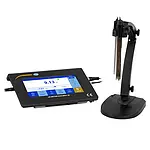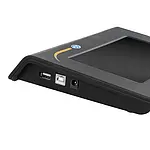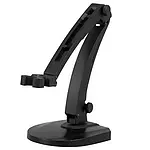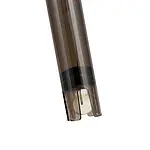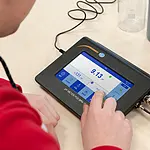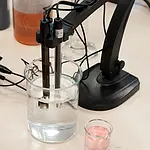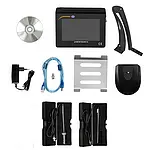IoT Sensor with automatic temperature compensation / Data storage for 300 measured values /
USB interfaces for mass data storage and PC connection / Large touchscreen /
Exchangeable probes / Stand for positioning the probes / Measuring range up to +19.999 pH / incl. ISO Calibration Certificate
With the IoT sensor it is possible to carry out quick and precise analysis of the pH concentration of liquid samples. For example, with the IoT sensor it is possible to check alkaline solutions, water, wine, milk and many other liquids for the pH content. The table IoT sensor has a measuring range of -2 … +19.999 pH. With the temperature probe of the IoT sensor it is also possible to determine the temperature of the sample. This is particularly important as the pH measurement is highly temperature dependent. This means that both manual and automatic temperature compensation is possible with the IoT sensor.
The IoT sensor has a large 7" touchscreen and an easy-to-use user interface. With the supplied electrode stand, the pH electrode and the temperature sensor on the table IoT sensor can be positioned appropriately in the samples. This has the particular advantage that the user can now fully concentrate on analyzing the measured values and operating the IoT sensor. This also prevents errors.
Another special feature of the IoT sensor is the multi-point calibration. This allows the IoT sensor to be calibrated to several reference points. This ensures that the measurement result is as accurate as possible. This is why the IoT sensor is also used in the analysis of samples in laboratories. The IoT sensor is also used in universities, vocational schools and other educational institutions. The multi-point calibration itself can be carried out with the optionally available pH buffer solutions.
The IoT sensor has a USB-A interface as a data interface. The measurement data stored on the IoT sensor can be transferred to any mass data storage device. The data from the IoT sensor are saved in XML data format. In addition to the USB-A interface for connecting mass data storage devices, there is also the USB-B connection for connecting the pH meter directly to a PC. The memory can now be read from the IoT sensor using the software. A live view via the software of the IoT sensor is also possible. A Bluetooth interface is also built into the IoT sensor. This allows the optional printer to be wirelessly connected to the IoT sensor.

